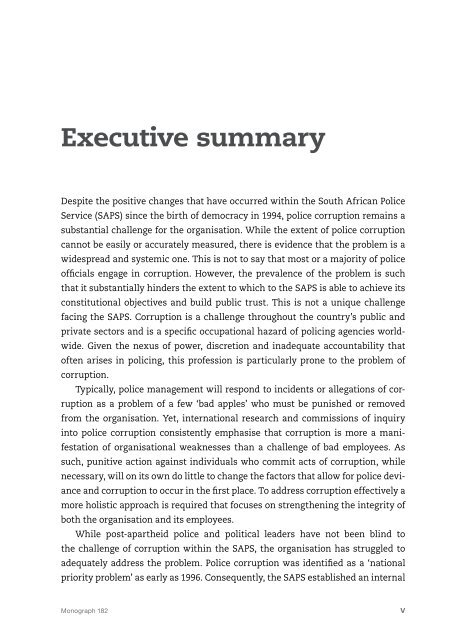Protector or predator? - Institute for Security Studies
Protector or predator? - Institute for Security Studies
Protector or predator? - Institute for Security Studies
Create successful ePaper yourself
Turn your PDF publications into a flip-book with our unique Google optimized e-Paper software.
Executive summary<br />
Despite the positive changes that have occurred within the South African Police<br />
Service (SAPS) since the birth of democracy in 1994, police c<strong>or</strong>ruption remains a<br />
substantial challenge f<strong>or</strong> the <strong>or</strong>ganisation. While the extent of police c<strong>or</strong>ruption<br />
cannot be easily <strong>or</strong> accurately measured, there is evidence that the problem is a<br />
widespread and systemic one. This is not to say that most <strong>or</strong> a maj<strong>or</strong>ity of police<br />
officials engage in c<strong>or</strong>ruption. However, the prevalence of the problem is such<br />
that it substantially hinders the extent to which to the SAPS is able to achieve its<br />
constitutional objectives and build public trust. This is not a unique challenge<br />
facing the SAPS. C<strong>or</strong>ruption is a challenge throughout the country’s public and<br />
private sect<strong>or</strong>s and is a specific occupational hazard of policing agencies w<strong>or</strong>ldwide.<br />
Given the nexus of power, discretion and inadequate accountability that<br />
often arises in policing, this profession is particularly prone to the problem of<br />
c<strong>or</strong>ruption.<br />
Typically, police management will respond to incidents <strong>or</strong> allegations of c<strong>or</strong>ruption<br />
as a problem of a few ‘bad apples’ who must be punished <strong>or</strong> removed<br />
from the <strong>or</strong>ganisation. Yet, international research and commissions of inquiry<br />
into police c<strong>or</strong>ruption consistently emphasise that c<strong>or</strong>ruption is m<strong>or</strong>e a manifestation<br />
of <strong>or</strong>ganisational weaknesses than a challenge of bad employees. As<br />
such, punitive action against individuals who commit acts of c<strong>or</strong>ruption, while<br />
necessary, will on its own do little to change the fact<strong>or</strong>s that allow f<strong>or</strong> police deviance<br />
and c<strong>or</strong>ruption to occur in the first place. To address c<strong>or</strong>ruption effectively a<br />
m<strong>or</strong>e holistic approach is required that focuses on strengthening the integrity of<br />
both the <strong>or</strong>ganisation and its employees.<br />
While post-apartheid police and political leaders have not been blind to<br />
the challenge of c<strong>or</strong>ruption within the SAPS, the <strong>or</strong>ganisation has struggled to<br />
adequately address the problem. Police c<strong>or</strong>ruption was identified as a ‘national<br />
pri<strong>or</strong>ity problem’ as early as 1996. Consequently, the SAPS established an internal<br />
Monograph 182<br />
v

















